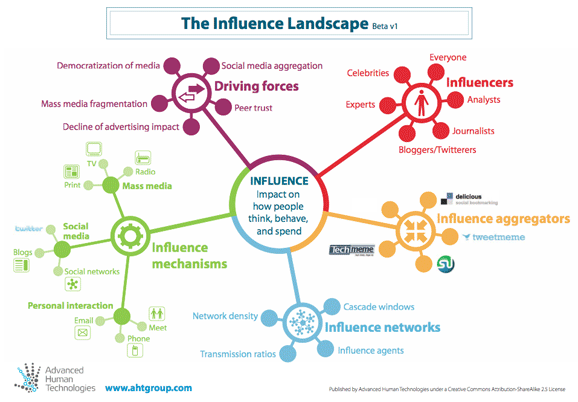Popularity vs. Influence in Blogging and Social Media: What’s the Difference?
By Jennifer Mattern on April 13, 2010

Credit: Advanced Human Technologies (www.ahtgroup.com)
You’ve heard about “influencers” right? That’s a big buzz word especially in the blogosphere these days (and it has been for a couple of years). What exactly is an influential blogger though? Do those lists of the most influential blogs or biggest influencers really mean much?
Honestly, they don’t. Why? Because sadly too many people confuse “influence” with basic popularity. Is there anything wrong with having a popular blog or being a popular personality in your niche or industry? No. Of course not. But being popular doesn’t mean you necessarily have a comparable amount of influence within that niche. Let’s explore both popularity and influence, and talk about why you really need to understand the difference. While we’ll look specifically at bloggers, the same can be true of those on Twitter, social networks, or who are active in any other area of social media.
Defining Popularity and Influence
What does it mean to be a “popular” blogger? It means that people like you (or they like your blog). Specifically related to blogging, it generally means a lot of people like you. You get a lot of traffic and / or a lot of unique visitors. You get a lot of comments. You get the idea….
If you have a lot of traffic, you naturally have a lot of influence, right? Wrong. Influence involves more than numbers. It involves your ability to influence outcomes, actions, and opinions.
The Biggest Difference Between Popularity and Influence

Being treated like a rock star doesn't always equal influence - Credit: BigStockPhoto.com
Let’s look at two hypothetical blogs to show why popularity doesn’t necessarily equate to influence. They’re both Internet marketing blogs. Blog A is a relatively high traffic blog — let’s say just under one million page views per month. Blog B gets around 75,000 page views per month instead (still not terrible, but clearly Blog A has them beat).
You could easily argue that Blog A is the more popular blog of the two. Assuming in this case that the larger number of page views comes from a larger number of unique visitors, Blog A has more readers / visitors.
That said, Blog B could still be the more influential blog. Numbers alone don’t cut it. The relationship between the blogger and their audience determines influence much more than traffic stats (or follower stats, or friend counts, etc.).
For example, maybe most of Blog A’s traffic comes from search engines. The visitors are one-time passers-by who only visit the page they land on. They read the content and then they move on. Blog B’s fewer readers are much more invested in the blog. They read regularly. They genuinely care about what the blogger has to say.
If Blogger A told their audience to do something, they might have less influence over their actual actions than Blogger B. The second blogger’s audience might be more likely to do what’s asked of them — think a certain way about a niche issue, try a new tool, take part in a survey, or even buy a product. That’s influence.
Popularity in blogging can leave a lot to chance (or basic search engine optimization). A blogger has to be able to take things a step further if they want to turn that popularity into influence. By all means, a popular blog can be influential. Many are. The mistake is in thinking that one necessarily equals or leads to the other.
Measuring Influence: Can it be Done?
Why do people often rank blogs by “influence” when they’re really only evaluating popularity metrics? Well, “influence” sounds better for starters. Who doesn’t want to feel like they have influence? It’s a power thing, whereas popularity is nice but it’s something tweens and teens are supposed to worry about — not professionals blogging within a given industry.

How do you measure success in social media? - Credit: BigStockPhoto.com
Influence sounds better, but popularity is easier to measure. So they get packaged together whether or not it’s completely fair, “right,” or accurate. Is it even possible to measure influence? Personally, I consider it more of a qualitative than quantitative element of blogging and social media, and as such I would have to say it’s difficult, if not impossible, to accurately measure.
A blogger with a relatively small audience might have major pull in the industry because of their network. If they report a problem to a company, it might be fixed in hours or days instead of buried in a mountain of support tickets. If they request a new feature from someone, they might actually get it whereas others would be ignored. They might be able to change the minds of their audience members about an issue that’s important to them. I don’t see how those things can be accurately or fairly measured. Would action #1 get more weight than action #2? How many minds do you have to change to be “influential?”
Sure, we can measure some elements of influence — how many readers were converted into customers, the number of survey respondents, donations received when a blogger gets behind a cause, etc. But we can’t measure enough of the factors that determine influence to really say Blogger A is more influential than Blogger B, because the results of influence aren’t always visible. To outsiders, it’s all subjective.
If you really must rank the most “influential” blogs in some way, do what you must. But why not call it what it really is — the “most popular” blogs — instead? The two can coincide. We don’t need to belittle the influence of some bloggers by calling them less influential than others simply because they’re better at targeting a narrow audience that cares about what they have to say. You don’t see what goes on behind the scenes. That “little” blogger you left off your list might be the one making a real difference. Let’s go back to calling a spade a spade, shall we?

